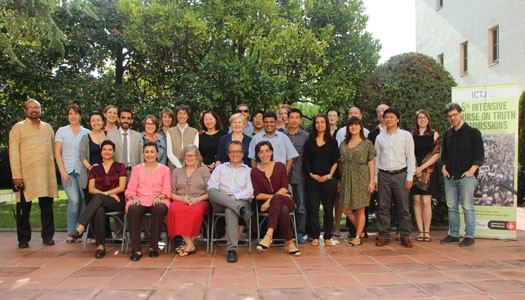Transitional justice practitioners and activists from 18 different countries gathered in Barcelona to attend the 6th Intensive Course on Truth Commissions, organized by the ICTJ and the Barcelona International Peace Resource Center on September 29 - October 3. The course provided expert training on the design and implementation of a truth commission. This year, the course specifically focused on the intersections between truth commissions and peace processes.
Participants from Tunisia, Colombia, Nepal, and other countries embarking on the creation of a truth commission –or considering the possibility of establishing one in the near future– learned about the experiences of South Africa, Peru, East Timor, and other contexts through the first-hand accounts of ICTJ instructors.
“Complying with the victims’ right to the truth about mass crimes is a state obligation. But it has to be done right: you need to hear from those with real-life experience, how exactly does a truth commission work, and what are the many pitfalls to avoid and opportunities to seize,” said Eduardo González, director of ICTJ’s Truth and Memory Program. “This course is the place to ask those questions, and a perfect environment for advocates and professionals engaged in post-conflict and post-authoritarian environments.”
This year, ICTJ’s President David Tolbert joined the Barcelona course for the first time. Together with González, Tolbert opened the training with a conversation on the challenges truth-seeking mechanisms face when they emerge from a negotiated peace process, and how important it is to carefully analyze the local context to ensure the success of such mechanisms.
“At the course we were able to hear and discuss the challenges and concerns from those who are leading the efforts to establish truth commissions on the ground, where circumstances may vary largely from one context to another,” Tolbert said. “This was as enriching for us, ICTJ, as it was for the participants.”
During his time in Barcelona, Tolbert held a public talk tackling on the Spanish case and the unaddressed legacy of the crimes of the civil war and Franco’s dictatorship. At the event, organized by Memorial Democràtic, Tolbert stressed that “it is clear that the victims and society at large have seen a very limited amount of truth, justice, or reparations in response to abuses of the Civil War and the dictatorship periods that followed.” He also offered recommendations on measures to be undertaken by the Spanish institutions, such as exhuming mass graves, providing reparations for all victims, and opening the archives.
As every year, the course’s biggest asset was the array of participants involved in human rights, mediation, peacebuilding, rule of law, and transitional justice in their countries. Below we present a selection of portraits of some of them, and the admirable work they do.
### Sihem Ben Sedrine
| Sihem Ben Sedrine, a former journalist, was recently appointed President of Tunisia’s Truth and Dignity Commission (TDC). The mission of the TDC is no easy task: to investigate gross human rights violations that were committed by the state or those who acted in its name between the years of 1955 and 2013. Ben Sedrine has been very busy lately. Before traveling to |
Ram Bhandari
| Ram Bhandari is one of the leading voices asking for truth, justice, and reparations for victims in Nepal as coordinator of the National Victims Alliance and founder of the National Network of Families of the Disappeared and the Missing, which are empowering and organizing victims locally. In 2001, Ram’s father was taken by the Nepali security forces, amidst of an |
Abdul Faizi
| Abdul Faizi is an activist and lawyer working to promote the rule of law and transitional justice in Afghanistan. Besides his legal work with the Open Society Foundations, Faizi has become a social media expert in his free time. He was “completely disappointed” after the last presidential campaign, when he saw warlords who had committed serious |
Shirley Gunn
| As a human rights and anti-Apartheid activist, Shirley Gunn has worked to demystify the legacy of the Truth and Reconciliation of South Africa (TRC) for years. “As an instrument from conflict to peace the TRC was very important, but we could have done better,” she argued. Internationally, South Africa’s TRC is regarded as a model achievement. |
To learn more about the intersections between truth commissions and peace processes, read ICTJ and Kofi Annan Foundation's publication "Challenging the Conventional: Can Truth Commissions Strengthen Peace Processes?"
